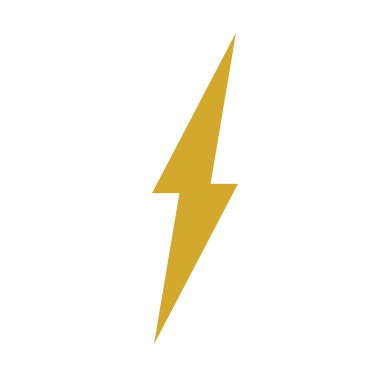Borg Collective
More actions
The Borg Collective is the most formidable enemy the Federation has ever faced, and was considered one of its greatest existential threats of its history - challenged only by the Dominion. It is a hive network of cybernetic and multi-species people originating and almost exclusively found in the Delta Quadrant, and purports to be driven by the search for biological and technical perfection.
Made up of an unknown number - but believed to number in the trillions - of ‘drones,’ almost every Borg has been physically and psychologically forcibly altered to match the needs of and be mentally connected by subspace link to the Collective, a process referred to as ‘assimilation’ which subsumes, if not outright destroys, their individuality. Once a vast power dominating the Delta Quadrant and a repeated serious risk to the governments of the Alpha and Beta Quadrants, in the latter quarter of the 24th century it came close to collapse.
In the early 25th century, the Borg have stirred again - first with their strike against the Federation on Frontier Day, followed soon by movements in the depths of the Beta and Delta Quadrant. With encounters for years limited to rumour, the present condition of the Collective is, at present, a mystery to Starfleet.
History
First Encounters
The true origins of the Borg are unknown to the Federation, though they are believed to originate from deep in the Delta Quadrant. The nature of deep space exploration and colonisation is that on occasion ships will go missing or contact will be lost with whole worlds, with no explanation ever confirmed. This birthed rumours of the Collective’s existence as far back as the early twenty-fourth century, though no Federation investigations found any evidence of substance prior to the 2360s.
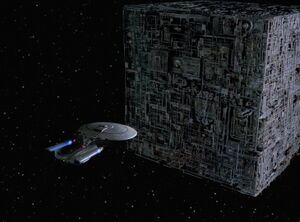
While a deep-space encounter by the USS Enterprise in 2365 was the first confirmed encounter with the Borg, an escalation in previous years of missing ships and lost Romulan Neutral Zone outposts has since been attributed to the Collective. This proved a prelude to invasion, with a single Borg Cube attacking the Federation in 2366. The assimilation of Captain Jean-Luc Picard and their own highly advanced technology enabled this lone ship to devastate and rout Starfleet at the Battle of Wolf 359. The Borg were stopped only by the USS Enterprise’s rescue of Captain Picard and subsequent use of his connection to the Collective to sabotage and destroy the cube.
A Decade of Encounters
This invasion left an indelible mark on the psyche of the Federation and, particularly, Starfleet. Aware that they had been technologically out-matched, the next decade of starship development saw a massive increase in militarisation with the hope of stopping the Borg, should they ever return.
While this inadvertently prepared Starfleet better for the threat of the Dominion a decade later, even the finest technological advances proved no match for the Borg upon their return to the Alpha Quadrant in 2374. Distrust by Starfleet Command of Captain Picard’s potential connection to the Collective saw the veteran commander and his ship side-lined at the start of the invasion, but at the Battle of Sector 001, even Starfleet’s most advanced ships were still ineffective against yet another single Borg Cube. Only the intervention of Picard, disobeying orders to bring his ship to the Sol System where he assumed command of the fleet, and his deployment of his personal knowledge of Borg systems enabled the cube’s destruction.
The Dominion War became Starfleet’s military priority after, and only the return of the USS Voyager in 2378, lost for seven years in the Delta Quadrant, brought new intelligence on the Borg Collective. Not only had Voyager survived multiple encounters with the Borg, including bringing aboard multiple former drones, but their near-instantaneous journey across tens of thousands of light-years was achieved through use of the Borg’s transwarp network. This daring mission necessitated not only the destruction of a transwarp hub, weakening a transportation system that stretched across vast reaches of the galaxy, but also the infection of the Collective with a neurolytic pathogen. While thought to be devastating, the exact extent of the damage done to the Borg Collective was unknown.
The Artifact
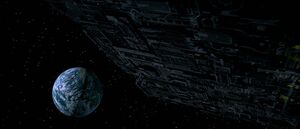
Subsequent encounters with the Borg Collective became much rarer. While a Cube’s incursion into Romulan territory in 2384 led to the assimilation of a scout ship and its twenty-six crewmembers, the vessel suffered a submatrix collapse soon after. The ship and all of its drones lost their connection to the Collective, a catastrophic accident believed made possible by the damage Voyager had done to the hive mind. The Cube became the property of the Romulan Free State and was dubbed the Artifact, a focus of research by both the Romulans and the Federation.
Huge advances were made in knowledge and understanding of Borg technology, but the disconnection of an entire Cube’s complement of drones had a further impact on the Alpha and Beta Quadrants. While many former drones were so traumatised by both their assimilation and separation that they struggled to live independently, remaining on the Cube either dormant or under the care of the Borg Artifact Research Institute, some left to recover their own lives.
Corruption in the Institute led to Borg technology, particularly harvested implants, being sold on the black market along the former Neutral Zone. This stoked the interest of several unscrupulous profiteers, who went so far as to abduct former Borgs - by then known as “xBs” - and murder them for their cybernetics. At this time, Starfleet is unaware of the exact size of this black market in Borg technology.
In 2399, a Tal Shiar-initiated attempted genocide of the xBs aboard the Artifact led to an uprising by the capable drones aboard, led by former Voyager crewmember Seven of Nine. Upon seizing control of the Artifact, the crew opened a transwarp conduit and departed Romulan space for the planet Coppelius. There it fell foul of automated defence systems, and crashed on the surface. After Starfleet protected the synthetic lifeforms of Coppelius from slaughter at the hands of the Romulan Free State, the wrecked Artifact remained, and most surviving xBs embarked on a new life in cooperation with the synth population.
While use of and research into Borg technology did not fall under the Federation’s ban on synthetic life, this wariness hampered its harnessing by Starfleet. Only after April 2400 and the lifting of the ban did Starfleet advance their harnessing of Borg technology in earnest. By early 2401, these developments began to see the field, such as with the launch of the Sagan-class, its systems rife with Borg technology turned to Starfleet will.
A New Queen
In early 2401, Starfleet ships detected an anomaly soon identified as a rift in space-time. A message through the rift invoked Article 15, a request to join the Federation, and demanded to speak to retired Admiral Jean-Luc Picard by name. The Starfleet task group gathered at the rift was soon confronted by an unrecognisable Borg ship, which emerged before it, and requested to send aboard a negotiator: a Queen. Despite Starfleet's refusal, the Queen beamed aboard the lead ship, the Sagan-class USS Stargazer, and despite claiming she desired peace, set about using its Borg-derived systems to seize control.
At the last possible moment, Admiral Picard ordered the crew of the Stargazer to stand down and let the Queen do her work. She revealed herself then to not be an entity familiar to the Federation, but something new: a fusion between Doctor Agnes Jurati, one of the Federation's foremost experts on artificial intelligence, and a Borg Queen from an alternate reality. The Jurati-Queen, a friend to Picard and the Stargazer's crew, explained the rift was not her doing, and she had come to stop it from growing to the extent it would devastate not only the sector, but perhaps the quadrant. Granted control of the task group, the Jurati-Queen used their shield harmonics to stabilise the anomaly. It remained open, a new form of transwarp conduit, but no longer expanding. The Jurati-Queen admitted she did not know who had made it, but believed them to be a threat, and asked for her and the Borg aboard her ship, separate from the main Collective and answering to her, provisional membership of the Federation. They would monitor the rift for danger and give warning if needed, act as 'a guardian of the gate.' They were granted this membership, left on their ship before the rift, and continue to monitor the anomaly to this day.
Frontier Day
Months later, the Federation was attacked by the Borg they had known for decades on April 14th: Frontier Day, a celebration that would bring the highest echelons of Starfleet and Federation leadership and one of the largest fleet gatherings in modern history together at Sol. This was also a chance to showcase the new Fleet Formation Mode, a technology allowing the fleet to act in perfect synchronisation under the control of a single flagship. Although the weeks ahead were rife with turmoil behind the scenes, the festivities went ahead, only for the Borg to show their hand at the peak of the celebration. A transmission was broadcast across all ships, a Borg signal to which only young officers in the fleet responded.
Their response was their spontaneous assimilation, and they all fell under the sway of the Collective - the original Collective - with one order: Kill all unassimilated. They seized control of the fleet and turned its weapons on Starbase One, with the ultimate goal of destroying Earth. Fleet Formation Mode fell under their power, too, ensuring that even ships whose crews had retained control would be helpless.
Only the intervention of Admiral Picard and the former crew of the USS Enterprise-D saved the day. They sourced the transmission to the atmosphere of Jupiter, where they found a transwarp conduit had opened to bring forth a Borg ship: that of a Queen, leader of a Collective ravaged by the neurolytic pathogen. She had allied with renegade Changelings, who had infiltrated Starfleet, engineering Frontier Day and reconfiguring transporters across the fleet to biologically alter all who passed through the system. The young were the most susceptible, altered so that upon the transmission of the Jupiter Signal, dormant bio-nanites in their bodies would activate, assimilating them instantly. Picard and his crew were able to stop the transmission and destroy the ship, ending the attack and freeing the assimilated immediately.
The Borg Queen had expressed that the Collective was shattered and broken, and shown her desperation by allying with the Changelings. She was killed by the crew of the Enterprise-D, and it was believed possible this was one final spasm of the dying Collective.
An Awakening
In June 2401, this was proved to be a false hope. In remote stretches of the Beta Quadrant, Starfleet sensors detected Borg activity. In the Delta Quadrant, the Collective began to mobilise again on the frontier. And across the galaxy, defunct Borg technology in graveyards or laboratories came alive, activating a homing signal that threatened to draw what remained of the Borg together. This was not a mass mobilisation or a new assault on the Federation, but a sign that something which had been dormant for decades was awakening.
In response, Starfleet was cautious, and the Fourth Fleet was activated to investigate and respond.
Society & Culture
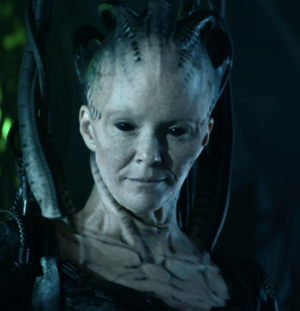
Hive Mind
The Borg Collective is made up of trillions of drones that are linked via subspace to form a vast hive mind, which is directed by the entity known as the Borg Queen. When a person is assimilated, initially the voices of the collective mind will frighten and overwhelm the new drone. All individuality is stripped from the person with very little distinction between drones. The only designation comes from within a group where a drone could be referred to as something akin to "Fourth of Seven"; the only other form of distinction comes from the primary role of a drone, for example: a tactical drone, a medial/repair drone, a maintenance drone.
The Borg are efficient and pragmatic in the management of drones. If one is beyond help or repair the Collective will deactivate it and begin salvage operations for reusable parts. Starfleet does not have a clear sense of whether or not the Borg can procreate on their own, but acquiring new drones through anything other than assimilation has never been observed other than in the apparent resurrection of their queens in similar or identical bodies, perhaps through cloning. Upon assimilation of younger humanoids they are placed in maturation chambers until ready to fully join the collective mind, as they have no use for children or adolescents that cannot work.
Borg Queen
Despite the name, the Borg Queen herself was not believed to be a single individual, but rather a manifestation of some form of overriding consciousness within the Collective that has a finite presence within each unimatrix. The true function and abilities of these specialized drones is not fully known. They have been observed to have more than just a symbolic or unifying role, however, as a queen at Unimatrix 001 was used to distribute the neurolytic pathogen that left the Borg in their current state. Along with this, Borg cubes were known to be equipped with the means to evacuate a Queen, either via an escape sphere or a specialized queencell containing a subspace trajector. This demonstrates that the Borg are unwilling - or at least reluctant - to sacrifice these specialized drones, even though they are quite willing to abandon thousands of standard drones with little provocation. It has also been presumed that the Queen's consciousness endures beyond one single body, and in the case of its death, another will simply activate with the same protocols and memories.
Starfleet has confirmed the deaths, or at least potential deaths through the destruction of their ships, of at least four Queens. Since the death of the Borg Queen on Frontier Day, there have been no more sightings of a new - a next - Borg Queen.
Interactions with Other Species
The Borg are known to ignore vessel and species that are no threat or whose inclusion in the Collective will not improve it biologically or technologically. This is believed to be why large numbers of Delta Quadrant species to be ignored, particularly in the Nacene Reach. Communication with the Borg is almost always limited to their signature call for the complete surrender of their enemies, with the warning "Resistance is futile," and negotiation has only ever been heard of on occasions where assimilation cannot give the Collective what it wants. In such cases the Borg may speak through their Queen, or a single drone is chosen and designated as a special liaison. In two notable situations, the Borg chose a drone to interact with Starfleet: when Jean Luc Picard was assimilated as Locutus of Borg and when Seven of Nine was chosen to liaise between the collective and Voyager. Oddly, a queen was seemingly available in both of these circumstances, but the Borg still chose to select (or create) a drone.
The Borg are at their most unpredictable when faced with an opponent they cannot defeat through their usual method of force. This was witnessed by Voyager when they learnt of Species 8472, who were resistant to Borg nanoprobes and immune to assimilation.
Philosophy
Little is known in what the Borg believe, other than their innate drive to assimilate other cultures to expand upon their own perfection. Starfleet captains and flag officers are aware that the Borg are known to revere the Omega molecule, and have sacrificed millions of drones pursuing this phenomenon, which they label Particle 010. Every Borg drone has a root command that instructs them to assimilate Omega at any cost, which is in direct conflict with Starfleet's Omega Directive, which insists that Omega must be destroyed at any cost. A sub-set of the Omega Directive places particular importance on not allowing the Borg to acquire Omega, as it is believed that they would be able to use its enormous power generating potential to take over the entire galaxy.
Technology
The Borg develop and advance their technology through assimilation of species, which has enabled them to become one of the most technologically advanced powers in the galaxy. Through this they have proven able to deploy technology such as sophisticated cybernetic implants for their drones and advanced weapon systems to enable assimilation of entire cultures.
Borg vessels normally deploy cutting beam technologies (similar to Starfleet phasers or Klingon/Romulan disruptors in deployment) which is able to, in conjunction with Borg torpedo technology, break down enemy defenses to allow for tractor beam deployment and assimilation. Vessels are in basic shapes such as cubes, spheres or diamonds with highly decentralized systems and no clear command center, engineering or living quarters. They are also equipped with transwarp coils as their primary source of power and propulsion, which allows them to travel at faster-than-warp speeds to cover great distances in much shorter times than other vessels by opening transwarp conduits. The Borg also operate large unimatricies; effectively very large starbase-type unicomplexes in strategically important locations.
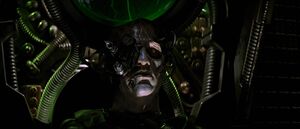
Drones do not require sleep due to their cybernetics, but instead undergo a regeneration cycle in a Borg alcove. While a drone is physically inert during this period, it is also when the Collective sorts the data downloaded from its active period, and its mental capabilities still continue to contribute to its vessels computations.
It is unknown to what extent the Borg continue to develop and advance technology they have procured, and they are slow to adopt or learn to counter technology they have merely observed. While they have proven ruthlessly efficient at incorporating technology from those they have assimilated, there is no evidence of independent research and development by the Collective. This is usually limited to weapon systems, or technology with an obvious and immediate application; while technologies that might support or enrich a culture in other ways are retained as knowledge in the Collective, they are effectively lost if that entire society has been assimilated, discarded as inefficient in the Borg’s pursuit of perfection. This can lead to the Collective experiencing periods of technological stagnation if they do not assimilate a species with new advancements, or which does not force them to adapt.
Current Status
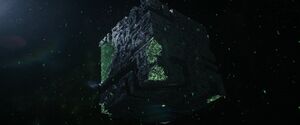
The journey of the USS Voyager confirmed the distant Delta Quadrant to be the seat of the Borg’s power, though their expansionism had been checked on occasion for a myriad of reasons. Most common were stellar phenomena inhibiting travel or communication, such as the region of Chaotic Space in the Gradin Belt. But for over a decade, the condition of the Collective after Voyager’s return was unknown to Starfleet.
Only the stabilisation of the Barzan Wormhole in 2389 and the formation of the Delta Exploration Initiative allowed the Federation to learn more of what Voyager had left in her wake. While over the next decade they could claim great advances in negotiation and understanding of Delta Quadrant races, little new has been learnt of the Borg Collective in that time. Locals from various regions have reported, however, that sightings of Borg ships are particularly rare, and until 2401, there had been no confirmed assimilation of more worlds since Voyager’s sabotage. Intelligence and limited reports still, however, made it clear that while the Collective may on the whole not be the threat it once was, individual Borg ships remain as formidable as they have ever been. Starfleet protocol continues to instruct captains to avoid the Borg under all circumstances; if their ship wants to fight, Starfleet will lose.
The Borg was presumed defeated, if only for a time, until 2401. Frontier Day made it possible that the Collective had been defeated once and for all, but the stirrings in the months since have proven that hope to be in vain. The Collective has only begun to probe the furthest reaches of territories known to the Federation, let alone their territory, but they may become a threat again in the Delta Quadrant. For the moment, instructions are to monitor and assess the situation.
Former Drones

Most individuals are never freed from the Collective. Those who do, such as many of the crew of the Artifact, are so traumatised by the recovery of their individuality they require lifelong care. Exceptions are incredibly rare, and the majority of them - apart from well-known figures such as Jean-Luc Picard and Seven of Nine - are former crewmembers of the Artifact, or were on the ship the Collective disconnected in the late-2360s for the presence of Hugh, a drone who had begun to develop his own sense of individuality. It was on the Artifact that they developed anything approaching a community, and adopted the term ‘xBs’ - ‘ex Borg’ - for themselves.
Fundamentally, assimilation by peoples of the Alpha and Beta Quadrants over the last two decades has been exceptionally rare, and their recovery even rarer. For example, it is believed the twenty-six crewmembers of the scout ship Shaenor are the only Romulans ever assimilated. While it is possible that some missing vessels whose fate has never been discovered fell foul of the Borg, no Federation ship bigger than a shuttle is confirmed to have been lost to the Collective since the Battle of Sector 001.
For any of these nearly-unique individuals who have broken free of the Collective and can live independently, existence is hard. They are widely distrusted if not reviled, and treated with apprehension even in the peaceful Federation. In volatile regions such as the old Neutral Zone, they are at risk from unscrupulous individuals who would profit from selling their cybernetic implants - which would almost always entail murder.
Starfleet Service
Membership in Starfleet is incredibly difficult for xBs to secure. It is most ‘common’ for those who were officers before their assimilation, and especially those for whom assimilation was brief. They undergo the most scrupulous of examination and evaluation ahead of being cleared for service, a process that might take years.
For example, Icheb, a former drone who was liberated by the USS Voyager was admitted to Starfleet Academy upon the ship’s return to the Alpha Quadrant, but this was the result of years of observation and evaluation that Icheb bore patiently - and that he was an adolescent once freed, finishing his education and training aboard Federation facilities. In contrast, Voyager crewmember Seven of Nine refused to undergo such a long process of scrutiny and eventually abandoned her pursuit of service in Starfleet. Despite her years of loyal contribution to Voyager, her ironically individualistic attitude and that she had been a drone since childhood contributed to a perhaps more-rigorous vetting process, and one which Seven refused to tolerate as Icheb had.
Any xBs trying to join Starfleet can expect this long and rigorous vetting process, and to be heavily scrutinised throughout their service. They must be whiter than white, more perfect and proving more trustworthy than anyone to be allowed to wear the uniform. This lack of trust in a serving Starfleet officer is unparalleled anywhere else in the organisation, and might be more challenged were xBs not such a miniscule minority; there are possibly no more than a hundred xBs living independently in the galaxy, let alone trying to be in Starfleet.
In Play
- For years, the Borg Collective was believed to be reduced as a threat. Starfleet encounters between 2378 and 2401 were almost non-existent and limited to distant observations or small-scale interactions. Only in recent months have the Borg proven themselves still dangerous. The nature of this danger is unclear, however. They are mobilising on distant frontiers of the Beta Quadrant, and in greater force in their territories in the Delta Quadrant, but have shown no signs of serious expansion.
- At present, encounters are limited to Borg ships conducting surveillance or answering homing beacons in or near Federation space. No Starfleet ships have been confirmed destroyed by the Borg, and no worlds known to the Federation have been assimilated.
- The Delta Quadrant is a little more dangerous. The Borg appear to be consolidating their former territories and gathering essential resources. It is possible they are returning to becoming a more regular threat in the region.
- Nowhere are the Borg aggressive. They act as they did in the early stages of writing in TNG: they perform their tasks efficiently and ignore what is not a threat.
- Despite all of this, individual Borg ships and drones remain as formidable as they ever have. They cannot be defeated by force of arms. This is never the story Star Trek has told about them as an enemy. Don’t meet them in a straight-up fight. They will win.
- Anything once of the Borg has been treated with enormous suspicion the past quarter-century. This includes technology; while Starfleet does study it, they presently prefer to learn how to best it if possible. In short, Starfleet ships aren’t packing Borg-derived superweapons; there’s still too much fear of what’s not known about this technology, or the risk the Collective might use it against them.
- This goes perhaps more so for former drones, or xBs. They are perhaps the most despised people in the galaxy, and live hard and lonely lives. Former Borg Starfleet officers must be exceptional individuals, be exceptionally well-behaved, and also have perhaps-unprecedented restrictions on their personal liberty to be allowed to serve.
- There remains a blossoming black market in the dark corners of the quadrants for Borg technology. This includes cybernetic implants from former drones - who have almost certainly been murdered for them to be acquired.
- No Borg Queen has been sighted since Frontier Day.
